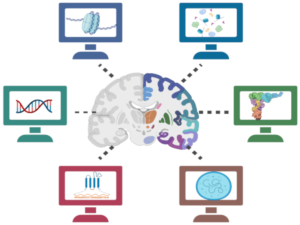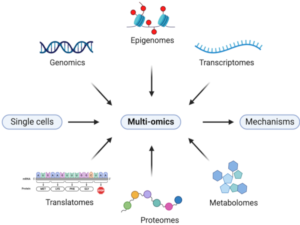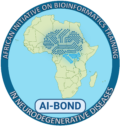Training in Neurodegenerative Diseases Research in Africa
AI-BOND Training Modules
Building Computational Research Capacities in Neurodegenerative Diseases Research in Africa
The AI-BOND course aims at training the next generation of African scientists, especially neuroscientists, in study design, cutting-edge techniques in data analysis, manuscript and grant writing to build a computational research workforce that will complement the global effort of “Building AD/ADRD Research Capacity in Africa.”
The AI-BOND program addresses this issue by providing accessible and high-quality online training in genetic epidemiology, biostatistics, and bioinformatics, explicitly focusing on neurodegenerative diseases. The program has brought together a multidisciplinary team of experts, including bioinformaticians, neuroscientists, educators, and mentors, to develop and deliver a curated curriculum combining theoretical knowledge and practical skills
This six-month online training program aims to bridge the bioinformatics knowledge and skill gap in neurodegenerative diseases, targeting students, neuroscientists, biologists, and clinicians across Africa. The AI-BOND program is designed to equip African scientists with the necessary bioinformatics tools for cutting-edge research on neurodegenerative diseases. It fosters a sense of community among researchers and promotes networking opportunities, essential for addressing the challenges posed by these diseases. The program is tailored to the African context, incorporating region-specific case studies and examples to ensure relevance and applicability to the unique healthcare landscape of Africa.

Module 1: PROGRAMMING
Introduction to programming
Introduction to R, SAS, Python, Linux
Introduction to HPC Computing
Introduction to Bioinformatics
Introduction to Biostatistics

Module 2: NEURODEGENERATIVE DISEASES
Concepts and Biology
Current Research and Methodologies
Neurodegenerative Diseases in Africa
Leveraging Existing Data and Databases
Statistical Approaches
Project Development

Module 3: GENETIC EPIDEMIOLOGY
Genome-wide association studies (GWAS)
Meta-analysis of GWAS
Whole-genome sequencing analysis
Whole-exome sequencing analysis
Mendelian Randomization and
in-silico functional genomics approaches

Module 4: INTEGRATIVE MULTI-OMICS
Transcriptomics analysis (Microarray Gene Expression, RNA-seq, scRNA-seq)
Epigenomic analysis (DNA-Methylation)
Microbiome Studies
Metabolomics and Lipidomics of Neurodegenerative Disease Biomarkers
